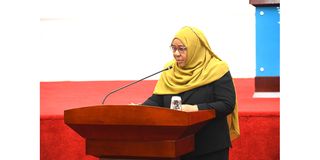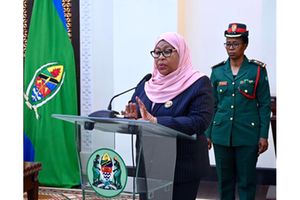Zanzibar lawmakers raise alarm over land disputes, call for accountability in budget debate

Minister for Lands and Housing Development, Rahma Kassim Ali, delivers the budget speech for her ministry at the House in Chukwani, Unguja, Zanzibar.
What you need to know:
- Tabling a proposed Sh345.4 billion budget before the Zanzibar House of Representatives during its 19th session in Chukwani, ministry officials outlined eight priority areas, including land use planning, housing development, and improved service delivery. But legislators were quick to shift focus to what they described as a deepening crisis of land mismanagement—one they say is often worsened by public servants themselves.
Unguja. The debate over the 2025/26 budget for the Ministry of Lands and Human Settlements in Zanzibar took a sharp turn today, Monday, May 18, as lawmakers accused government officials of fuelling rampant land disputes and demanded urgent reforms to restore public trust and ensure fairness in land administration.
Tabling a proposed Sh345.4 billion budget before the Zanzibar House of Representatives during its 19th session in Chukwani, ministry officials outlined eight priority areas, including land use planning, housing development, and improved service delivery. But legislators were quick to shift focus to what they described as a deepening crisis of land mismanagement—one they say is often worsened by public servants themselves.
“We cannot talk about development when land conflicts dominate every corner of the islands. And disturbingly, some of those in authority are behind the chaos,” said Kwahani Representative Yahya Rashid Mamba.
He called for the establishment of tougher legal frameworks to rein in state actors involved in land disputes, which have increasingly become a source of frustration and tension among citizens.
Paje Representative Dr. Soud Nahoda Hassan pointed to the lack of a structured land use plan as a key factor behind unregulated construction and mushrooming conflicts in Zanzibar’s urban and peri-urban areas.
“Zanzibar’s land is finite, but our population is growing. Without long-term urban planning and vertical housing solutions, we are heading for disaster,” he warned.
Pandani Representative Prof. Omar Fakih Hamad took aim at senior government officials, including regional and district commissioners as well as ward leaders (masheha), accusing them of exploiting loopholes in land administration to enrich themselves.
“Land is a public good, not a private inheritance. Yet, those entrusted to protect it have become the very people who abuse the system,” he lamented.
He further criticised the slow pace of land surveying, pointing out that a project launched in 1992 with a five-year implementation window is still incomplete—more than three decades later.
Lawmakers also challenged the credibility of the government’s affordable housing initiative, arguing that the units being constructed are out of reach for most Zanzibaris.
“You cannot call these affordable homes when only the wealthy can afford them. What about low-income earners and public servants?” asked Uzini Representative Haji Shaaban Waziri.
Mtoni legislator Hussein Ibrahim Makungu cited the absence of a proper land information system as another critical weakness contributing to multiple ownership claims and forged land titles.
“Without a digitised and secure registry, fake land titles will continue to proliferate, and disputes will never end,” he said.
Makungu also decried the government’s failure to provide compensation to residents whose homes are demolished to pave the way for public infrastructure projects.
“Development is welcome, but not at the expense of people’s livelihoods. Families are left homeless without compensation, leading to bitterness and social resentment,” he said.
In defending the proposed budget, Minister for Lands and Human Settlements Development Rahma Kassim Ali said the ministry is committed to implementing reforms across eight key areas, including the construction of residential and commercial housing, digital transformation of land services, and the preparation of urban master plans for towns in Unguja and Pemba.
She also pledged to scale up public awareness campaigns through traditional and digital platforms to educate citizens on land rights and responsibilities.
Chairman of the House Lands Committee, Yahaya Rashid Abdulla, supported the lawmakers’ concerns, stating that the committee’s own findings point to frequent conflicts over land boundaries, double allocations, encroachment on public land, and increasing land speculation.
“If left unaddressed, these challenges will derail Zanzibar’s development goals and risk turning land into a source of instability rather than opportunity,” he said.


